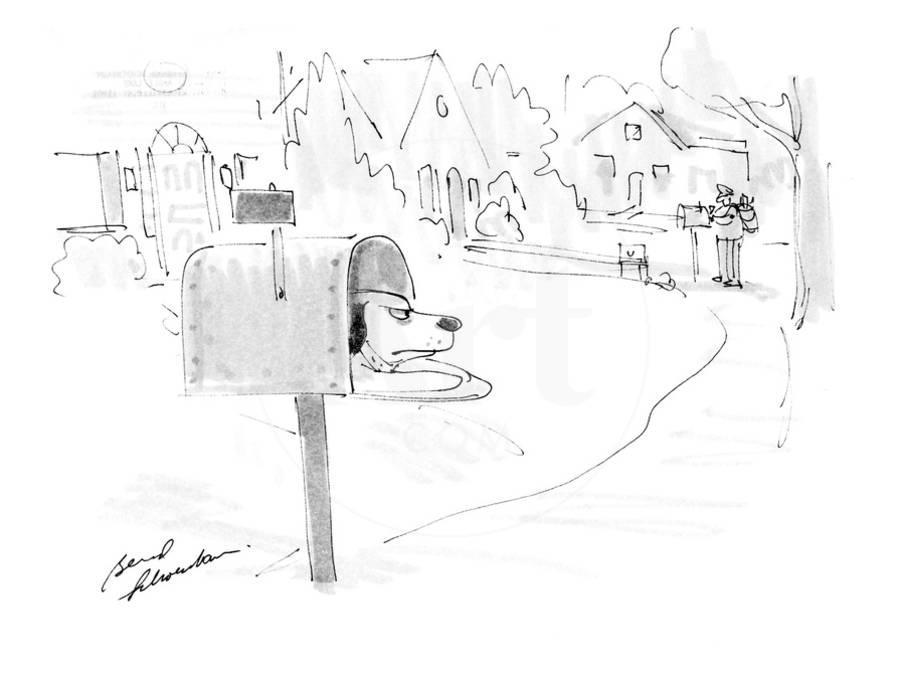
Dogs can injure persons in numerous ways, not just by biting. A dog can bite, scratch, trip, knock down, or frighten a person, causing damage.
A dog fright case is one in which the behavior of the dog causes a reasonable person to take defensive action which results in that person’s injury. An example of this type of fright occurred in Minnesota where a postal delivery driver went to deliver a package. The owner of the house neglected to train their dog who, upon seeing the driver, chased them down the driveway. Though the dog never actually bit the postal worker, the worker—while running—fell and suffered numerous injuries. Due to dog fright related statutes, the owner of the dog was found liable for the postal workers’ injuries.
A chase does not have to ensue to merit recovery: most dog fright injuries are caused by a dog lunging at a door or fence—without running at the individual—causing a person to jump back, fall, and sustaining an injury. Other instances of dog fright include cyclists who ride past a home with a dog. If a dog barks and scares the cyclist off their bike, injuries may occur. Here, the cyclist may still recover from the owner for their injuries from fright. The most important aspect of dog fright is to not blame the dog: you appropriate fault on the owner.
How may I Recover?
Under Minnesota Statute § 347.22, the owner of the dog is liable to any damages suffered. The injured party does not need to prove any negligence on the part of the owner. The statute provides:
“If a dog, without provocation, attacks or injures any person who is acting peaceably in any place where the person may lawfully be, the owner of the dog is liable in damages to the person so attacked or injured to the full amount of the injury sustained. The term “owner” includes any person harboring or keeping a dog but the owner shall be primarily liable. The term “dog” includes both male and female of the canine species.” Minn. Stat. § 347.22 (2019).
This statute imposes absolute liability on the owner of a dog who injures another person. Erickson v. Hammermeister, 458 N.W. 2d 172, 174-75 (Minn. App. 1990); Seim v. Garavalia, 306 N.W. 2d 806, 809 (Minn. 1981). Comparative fault rules do not apply to a statutory cause of action for strict liability. Id. at 812.
The statute applies even in cases where there is no physical contact between the dog and the injured individual. Morris v. Weatherly, 488 N.W. 2d 508, 510 (Minn. App. 1992). A claim is viable if the injury results from either hostile or non-hostile actions of the animal and is not limited to vicious bite attacks. Id.; Boitz v. Preblich, 405 N.W. 2d 907, 910 (Minn. App. 1987).
Additionally, the Minnesota Supreme Court recently rejected the “focus” requirement as applied to this statute, which required the actions of the animal to be “focused” on the injured individual for a claim to be maintained. Anderson v. Christopherson, 816 N.W. 2d 626, 631 (2012). They held that “[t]he correct question to be answered…is whether the dog’s conduct was the proximate cause of the plaintiff’s injuries such that injury was the direct and immediate result.” Id. The dog, in causing the injuries, solidifies liability on the owner.
Next Steps
Following an injury, a prudent course of action is getting the injuries evaluated at a local hospital. Then call an attorney.

This post was created by Katherine Brown Holmen, a personal injury, worker’s compensation, and wrongful death attorney at Dudley and Smith P.A. with help from Alexander Koch, a law clerk and current student at Mitchell Hamline School of Law. Katherine has over 24 years of experience and has worked on thousands of medical and income loss benefit claims.
If you or a loved one were injured or suffered death because of dog fright, please contact Katherine Brown Holmen at 651-291-1717 or by email at kholmen@dudleysmith.com! Dudley and Smith, P.A. is a full service law firm with offices in St. Paul, Blaine, Bloomington, Burnsville, Chanhassen, White Bear Lake, and Woodbury.

The law is continually evolving and Dudley and Smith, P.A.’s blog posts should not be relied upon as legal advice, nor construed as a form of attorney-client relationship. Postings are for informational purposes and are not solicitations, legal advice, or tax advice. A viewer of Dudley & Smith, P.A.’s blog should not rely upon any information in the blog without seeking legal counsel.

